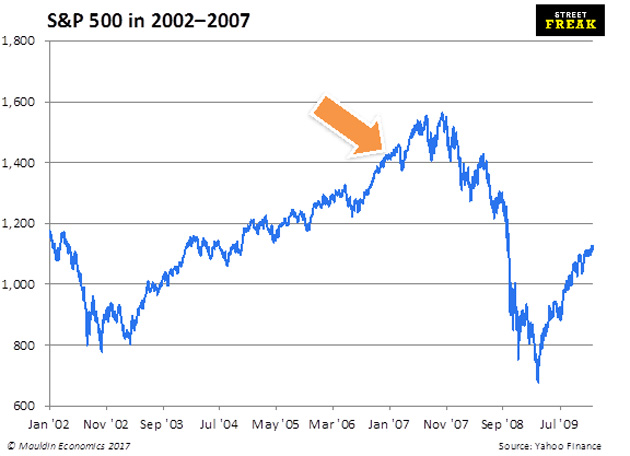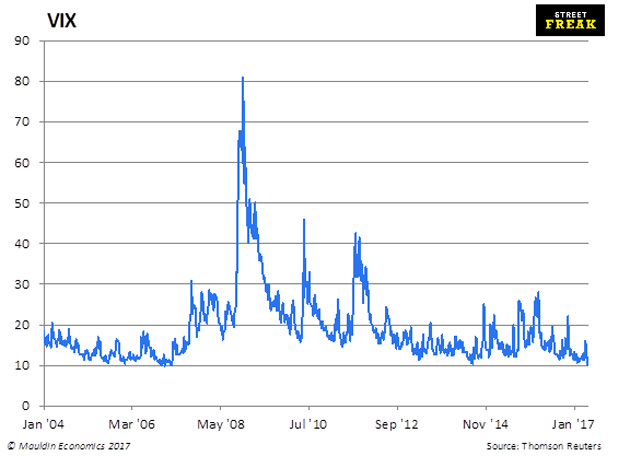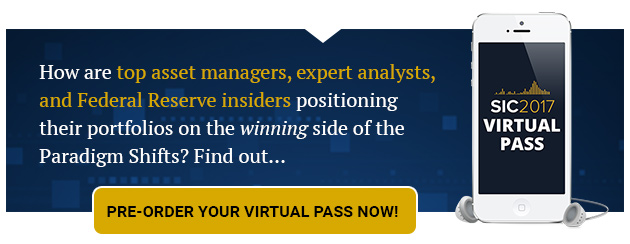| -- | May 11, 2017 Bull Market, Dude  This one will be familiar to old The Daily Dirtnap subscribers. Around the summer of 2006, when I was at Lehman Brothers, I started bellyaching in my notes to clients about how the market went up every day. I am a pretty creative guy, so every day I had very colorful (and irreverent) things to say about how stocks went relentlessly higher and how my life sucked. This went on for a couple of months. Then, one day I sent out a whining email about stocks and I got back a three-word reply from a hedge fund trader: “Bull market, dude.” In almost 20 years in the investment business, I think those are the most profound words I have ever heard. There is a lot of wisdom in “bull market, dude”: - It will turn when it turns, not before.
- In bull markets, you can only be long or flat, not short.
- Everyone is making money except for you.
Etc. Incidentally, here is a chart of the S&P 500 around that time—the arrow points to the “bull market, dude” email.  The “bull market, dude” guy ended up top-ticking himself, but it doesn’t mean he wasn’t right. The Situation Today We have all the classic warning signs of a big stock market top: - Retail looking smart, pros looking stupid
- Short rates rising, curve flattening
- Pain trade is probably lower, not higher
And yet people are mostly ignoring them.  I’m not kidding about credit and vol. The same thing happened pre-financial crisis. Same thing. The VIX dipped below 10 and options were still a sale, because realized vol was even lower. There was nothing to do. As it turns out, that was a pretty good leading indicator of some major financial stress. There are a lot of people who say that you can’t predict bear markets, so you might as well just ride them out and dollar cost average. Also true—for most people. If you drill teeth for a living, you probably don’t have any business trying to time market cycles. Perhaps you rely on me for that. Better than nothing. But it is true that if your time horizon is basically infinite (retirement 40 years away), it doesn’t make a lot of sense to try to avoid a 20% speed bump. If you’re a professional investor, then you care very much about avoiding (or capitalizing on) bear markets. Problem is, the timing is still impossible. “Professional” investors have been buying cheap stocks and selling expensive ones for the last four years, and they keep getting carried out, because nobody has that kind of staying power. You might be right in 2017, but if you were early in 2013, it doesn’t really matter. All of investing is a push/pull between being early and being right. Smart guys are always early. Very smart guys are always very early. The smartest guys can see stuff years in advance. And their returns are often the lowest, because they shoot before the squad is ready. Silly example: Amazon has been a joke since 2012. Unless you think it will someday raise prices, it doesn’t matter if it is the biggest company in the world, it is still a zero. Finance 101, discounting cash flows. The nature of markets is that sometimes markets care about cash flows in the future, and sometimes markets care about cash flows today. Do you remember 2001-2002, during the dot-com bust? If the stock in question didn’t have real earnings and pay a real dividend, it was taken out with the trash. And that will happen again.  Matter And Gravity Stocks and bonds are securities. They give off cash flows. Currencies aren’t really securities, but they also give off cash flows (these days, sometimes negative). Stocks, bonds, and currencies are “things.” Credit and volatility are different. They are not things. They are a force. Let’s put this in physics terms: if stocks and bonds are matter, then credit and volatility are gravity—the force that holds matter together. Except gravity is not constant in the universe (or finance). It can vary across time. Right now gravity is very strong. Someday, it may be very weak. That’s why market experts pay so much attention to credit and volatility to gauge the health of the financial markets. When credit gets rich, people are willing to receive 4.5% coupons on cov-lite pik-toggle deals. At the top of every cycle, the cov-lite stuff comes out. Remember, “credit” comes from the Latin “credere,” which means trust. There is no shortage of trust going around these days. Volatility (as a measure of the price of options) is probably the most over-interpreted market statistic around. In general terms, it is a measure of fear or complacency. But it is also driven by other concerns: when interest rates are low, people are incentivized to sell options for income. You know that the Fed suppresses volatility—well, this is how it happens in practice. Credit and vol tell us that financial conditions are very overheated. Do with that information what you wish. It may not be the best time to initiate a new position in a stock like Amazon. It might be a good time to accumulate cash, which gives you the option to buy something cheaper at a later date. People are always so derisive of cash in the bank. Your money isn’t “doing” anything. Actually, my money is just waiting for a better opportunity. My number one investment idea right now?* 
Source: galacticconnection.com *That’s not strictly true. I sent out an email the other day, taking a small victory lap on Macron, France, and the hugely-against-consensus ETF that’s up nearly 20% since I recommended it to my Street Freak subscribers. Even in a bull market, dude, there are still good opportunities. If you didn’t see that email, here’s the recap: right now you can take $100 off Street Freak, or $200 off Street Freak and The Daily Dirtnap. Both offers have money-back guarantees, which I don’t like, so it should be a pretty easy decision. If you’re seeing the warning signs of a stock market top, too, you may want to check it out. 
Jared Dillian
Editor, The 10th Man
 | Get Thought-Provoking Contrarian Insights from Jared Dillian
Meet Jared Dillian, former Wall Street trader, fearless contrarian, and maybe the most original investment analyst and writer today. His weekly newsletter, The 10th Man, will not just make you a better investor—it's also truly addictive. Get it free in your inbox every Thursday. |
Jared's premium investment service, Street Freak, is available now. Click here for our introductory offer. Jared Dillian, former head of ETF Trading at one of the biggest Wall Street firms and author of the highly acclaimed books, Street Freak: Money and Madness at Lehman Brothers , and All the Evil of This World , shows you how to pick and trad e trends, and master your inner instincts. Learn how to use “Angry Analytics” as a leading indicator of budding trends you can profit from… and how to view any market situation through the lens of a trader. Jared’s keen insight into market psychology combined with an edgy, provocative voice make Street Freak an investment advisory like no other. Follow Jared on Twitter at @dailydirtnap. Share Your Thoughts on This Article
 http://www.mauldineconomics.com/members
Use of this content, the Mauldin Economics website, and related sites and applications is provided under the Mauldin Economics Terms & Conditions of Use. Unauthorized Disclosure Prohibited The information provided in this publication is private, privileged, and confidential information, licensed for your sole individual use as a subscriber. Mauldin Economics reserves all rights to the content of this publication and related materials. Forwarding, copying, disseminating, or distributing this report in whole or in part, including substantial quotation of any portion the publication or any release of specific investment recommendations, is strictly prohibited.
Participation in such activity is grounds for immediate termination of all subscriptions of registered subscribers deemed to be involved at Mauldin Economics’ sole discretion, may violate the copyright laws of the United States, and may subject the violator to legal prosecution. Mauldin Economics reserves the right to monitor the use of this publication without disclosure by any electronic means it deems necessary and may change those means without notice at any time. If you have received this publication and are not the intended subscriber, please contact service@mauldineconomics.com. Disclaimers The Mauldin Economics website, Yield Shark, Thoughts from the Frontline, Patrick Cox’s Tech Digest, Outside the Box, Over My Shoulder, World Money Analyst, Street Freak, Just One Trade, Transformational Technology Alert, Rational Bear, The 10th Man, Connecting the Dots, This Week in Geopolitics, Stray Reflections, and Conversations are published by Mauldin Economics, LLC. Information contained in such publications is obtained from sources believed to be reliable, but its accuracy cannot be guaranteed. The information contained in such publications is not intended to constitute individual investment advice and is not designed to meet your personal financial situation. The opinions expressed in such publications are those of the publisher and are subject to change without notice. The information in such publications may become outdated and there is no obligation to update any such information. You are advised to discuss with your financi al advisers your investment options and whether any investment is suitable for your specific needs prior to making any investments.
John Mauldin, Mauldin Economics, LLC and other entities in which he has an interest, employees, officers, family, and associates may from time to time have positions in the securities or commodities covered in these publications or web site. Corporate policies are in effect that attempt to avoid potential conflicts of interest and resolve conflicts of interest that do arise in a timely fashion.
Mauldin Economics, LLC reserves the right to cancel any subscription at any time, and if it does so it will promptly refund to the subscriber the amount of the subscription payment previously received relating to the remaining subscription period. Cancellation of a subscription may result from any unauthorized use or reproduction or rebroadcast of any Mauldin Economics publication or website, any infringement or misappropriation of Mauldin Economics, LLC’s proprietary rights, or any other reason determined in the sole discretion of Mauldin Economics, LLC. Affiliate Notice Mauldin Economics has affiliate agreements in place that may include fee sharing. If you have a website or newsletter and would like to be considered for inclusion in the Mauldin Economics affiliate program, please go to http://affiliates.pubrm.net/signup/me. Likewise, from time to time Mauldin Economics may engage in affiliate programs offered by other companies, though corporate policy firmly dictates that such agreements will have no influence on any product or service recommendations, nor alter the pricing that would otherwise be available in absence of such an agreement. As always, it is important that you do your own due diligence before transacting any business with any firm, for any product or service. © Copyright 2017 Mauldin Economics | -- |
